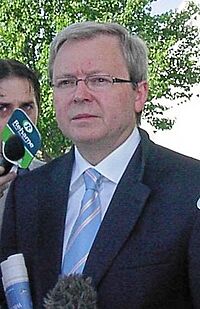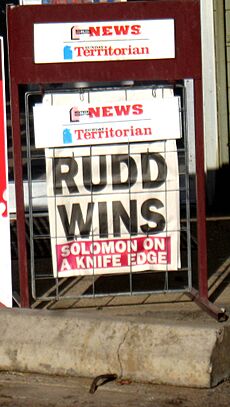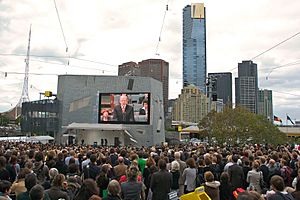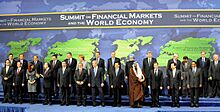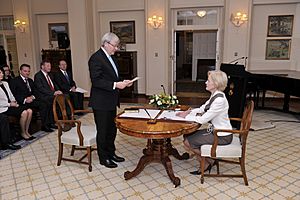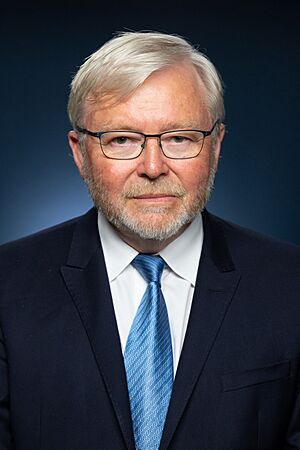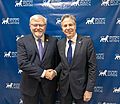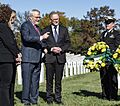Kevin Rudd facts for kids
Quick facts for kids
Kevin Rudd
|
|
|---|---|
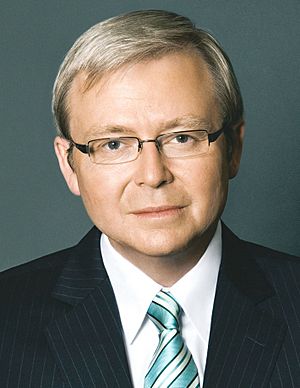
Official portrait, 2007
|
|
| 23rd Ambassador of Australia to the United States | |
| Assumed office 20 March 2023 |
|
| Prime Minister | Anthony Albanese |
| Preceded by | Arthur Sinodinos |
| 26th Prime Minister of Australia | |
| In office 27 June 2013 – 18 September 2013 |
|
| Monarch | Elizabeth II |
| Governor General | Quentin Bryce |
| Deputy | Anthony Albanese |
| Preceded by | Julia Gillard |
| Succeeded by | Tony Abbott |
| In office 3 December 2007 – 24 June 2010 |
|
| Monarch | Elizabeth II |
| Governor General |
|
| Deputy | Julia Gillard |
| Preceded by | John Howard |
| Succeeded by | Julia Gillard |
| 18th Leader of the Labor Party | |
| In office 26 June 2013 – 13 September 2013 |
|
| Deputy | Anthony Albanese |
| Preceded by | Julia Gillard |
| Succeeded by | Bill Shorten |
| In office 4 December 2006 – 24 June 2010 |
|
| Deputy | Julia Gillard |
| Preceded by | Kim Beazley |
| Succeeded by | Julia Gillard |
| Leader of the Opposition | |
| In office 4 December 2006 – 3 December 2007 |
|
| Prime Minister | John Howard |
| Deputy | Julia Gillard |
| Preceded by | Kim Beazley |
| Succeeded by | Brendan Nelson |
| Minister for Foreign Affairs | |
| In office 14 September 2010 – 22 February 2012 |
|
| Prime Minister | Julia Gillard |
| Preceded by | Stephen Smith |
| Succeeded by | Bob Carr |
| Member of the Australian Parliament for Griffith |
|
| In office 3 October 1998 – 22 November 2013 |
|
| Preceded by | Graeme McDougall |
| Succeeded by | Terri Butler |
| Personal details | |
| Born |
Kevin Michael Rudd
21 September 1957 Nambour, Queensland, Australia |
| Political party | Labor |
| Spouse | |
| Children | 3 |
| Profession |
|
| Signature | |
| Nickname | Kevin 07 |
| Education |
|
| Alma mater | |
| Scientific career | |
| Thesis | China’s New Marxist Nationalism: Defining Xi Jinping’s Ideological Worldview (2022) |
| Doctoral advisor |
|
Kevin Michael Rudd (born 21 September 1957) is an Australian diplomat and former politician. He served as the 26th prime minister of Australia twice, from 2007 to 2010 and again in 2013. He was the leader of the Labor Party from 2006 to 2013. Since March 2023, Rudd has been Australia's ambassador to the United States.
Born in Nambour, Queensland, Rudd grew up on a dairy farm. He studied Chinese studies at the Australian National University and speaks fluent Mandarin. Before entering politics, he worked as a diplomat and for the Queensland state government. In 1998, he was elected to the Australian House of Representatives.
In 2006, Rudd became the leader of the Labor Party. He led the party to a big win in the 2007 election. As prime minister, he signed the Kyoto Protocol on climate change and gave a national apology to Australia's Indigenous peoples for the Stolen Generations. His government also helped Australia avoid a major economic downturn during the 2008 financial crisis.
Rudd resigned as prime minister in 2010 after losing support within his party. He was replaced by his deputy, Julia Gillard. He later served as Minister for Foreign Affairs in her government. In 2013, he became prime minister again for a short time before his party lost the 2013 election.
After leaving parliament, Rudd has remained active in international affairs and academia. He earned a doctorate from Jesus College, Oxford in 2022.
Contents
Early life and education
Kevin Rudd was born in Nambour, Queensland, and grew up on a dairy farm in Eumundi. He was the youngest of four children. When he was a young boy, he had rheumatic fever, which damaged his heart valves. This illness required him to spend a lot of time resting at home.
When Rudd was 11, his father died, and his family had to leave their farm. This was a difficult time for them. Because of this experience, Rudd joined the Australian Labor Party when he was 15 years old. He wanted to support policies that helped families in need.
Rudd was a good student. He was the top student, or dux, of Nambour State High School in 1974. He went on to study at the Australian National University in Canberra. He majored in Chinese language and history and became very good at speaking Mandarin.
Early career
In 1981, Rudd joined the Department of Foreign Affairs as a diplomat. He worked in Australian embassies in Stockholm, Sweden, and Beijing, China. In Beijing, he was responsible for reporting on Chinese politics and economic changes.
In 1988, he became the Chief of Staff to Wayne Goss, who was the leader of the Labor Party in Queensland. When Goss became the Premier of Queensland, Rudd became the Director-General of the Office of Cabinet. In this role, he was a very powerful public servant in the state. He helped create a national program for teaching foreign languages in schools.
After leaving the Queensland government, Rudd worked as a China consultant for the accounting firm KPMG Australia.
Entering politics
Rudd first ran for the Australian Parliament in 1996 but was not successful. He ran again in the 1998 election for the seat of Griffith and won.
In his first speech to Parliament, he talked about his own childhood experiences with poverty. He argued for the importance of government support for things like hospitals and housing.
After the 2001 election, Rudd was promoted to the Shadow Cabinet as the Shadow Minister for Foreign Affairs. He became well-known for his knowledge of foreign policy, especially during the debates about the 2003 war in Iraq.
Leader of the Opposition
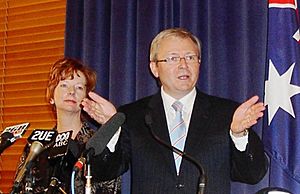
By 2006, opinion polls showed that Rudd was more popular than the Labor Party's leader at the time, Kim Beazley. In December 2006, Rudd challenged Beazley for the leadership and won. He became the Leader of the Opposition. Julia Gillard was elected as his deputy.
As leader, Rudd promised a "new style of leadership." He focused on important issues like industrial relations, climate change, and the war in Iraq. Under his leadership, the Labor Party quickly became more popular than the government led by Prime Minister John Howard.
The 2007 election
The 2007 federal election was held on 24 November. Rudd led the Labor Party to a landslide victory, which the media called a "Ruddslide." Labor won many seats, especially in Rudd's home state of Queensland. This made him the first prime minister from Queensland since Andrew Fisher in 1910.
First term as Prime Minister (2007–2010)
Kevin Rudd was sworn in as the 26th prime minister of Australia on 3 December 2007. One of his first actions was to ratify the Kyoto Protocol, an international agreement to fight climate change.
Key policies and events
Apology to the Stolen Generations
On 13 February 2008, Rudd delivered a national apology to the Stolen Generations. The Stolen Generations were Indigenous children who had been forcibly removed from their families by past governments. The apology was a historic moment and was supported by all parties in parliament. Rudd also promised to work on "Closing the Gap" in health and education between Indigenous and non-Indigenous Australians.
The global financial crisis
In 2008, a major financial crisis affected countries around the world. The Rudd government acted quickly to protect Australia's economy. It provided stimulus packages, which included cash payments to families and funding for new projects like schools and roads. These actions helped Australia become one of the only developed countries to avoid a recession.
Climate change
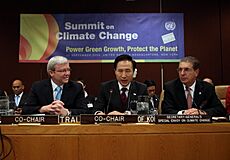
Rudd made tackling climate change a major priority. His government proposed a plan called the Carbon Pollution Reduction Scheme to reduce greenhouse gas emissions. However, the plan was blocked in the Australian Senate. In April 2010, Rudd announced that the government would delay the scheme. This decision was unpopular with many people.
Resignation in 2010
By mid-2010, Rudd's popularity had fallen. Some members of his own party were unhappy with his leadership style and his decision to delay the climate change scheme. On 23 June 2010, his deputy, Julia Gillard, challenged him for the leadership.
Seeing that he did not have enough support to win, Rudd resigned as prime minister on 24 June. He was the first Australian prime minister to be removed from office by his own party during his first term. Gillard became Australia's first female prime minister.
Foreign Minister and leadership tensions
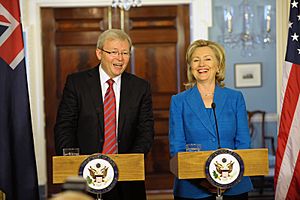
After the 2010 election, Prime Minister Gillard appointed Rudd as the Minister for Foreign Affairs. In this role, he represented Australia on the world stage.
However, tensions between Rudd and Gillard continued. There was constant media speculation that Rudd wanted to become prime minister again. In February 2012, Rudd resigned as Foreign Minister and challenged Gillard for the leadership. Gillard won the vote, and Rudd returned to the backbenches.
Another leadership vote was held in March 2013, but Rudd chose not to run.
Second term as Prime Minister (2013)
By June 2013, the Labor Party was struggling in the opinion polls. Many believed the party would lose the upcoming election with Gillard as leader. On 26 June 2013, Gillard called another leadership vote. This time, Rudd challenged her and won.
Rudd was sworn in as prime minister for the second time on 27 June 2013. He immediately called a federal election for 7 September. However, the Labor Party lost the election to the Coalition, led by Tony Abbott. Rudd's second term as prime minister lasted less than three months.
After politics
Rudd resigned from Parliament in November 2013. Since then, he has been involved in international affairs and academic work. He has held positions at several universities, including Harvard University and the University of Oxford, where he earned a doctorate in 2022.
He is the president of the Asia Society Policy Institute in New York. He has also written several books about his life in politics and on international relations, particularly between the United States and China.
In December 2022, Prime Minister Anthony Albanese announced that Rudd would become Australia's ambassador to the United States. He began this role in March 2023.
Personal life
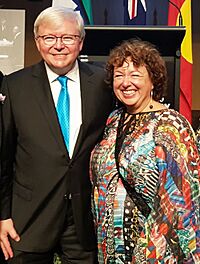
Rudd married Thérèse Rein in 1981. They have three children. Rein is a successful businesswoman who founded a large employment services company.
Rudd has had two heart surgeries to replace a faulty heart valve caused by rheumatic heart disease he had as a child. The first was in 1993 and the second in 2011.
He is a Christian and has often spoken about how his faith influences his political views. He and his family attend an Anglican church in their home suburb of Bulimba, Brisbane.
Images for kids
-
Rudd and US President George W. Bush meet at APEC Australia 2007 in Sydney
-
Rudd and US President Barack Obama at a G20 meeting, September 2009
-
Bronze bust at the Prime Minister's Avenue in the Ballarat Botanical Gardens
-
Rudd with the Australian Defence Force in Pakistan, August 2010
-
Rudd campaigning in Brisbane in 2013
-
Rudd with U.S. Secretary of State Antony Blinken in May 2022
-
Rudd was appointed as Australia's ambassador to the U.S. by prime minister Anthony Albanese in March 2023
-
Rudd at the book launch for the first volume of his autobiography at Bulimba State School, October 2017
See also
 In Spanish: Kevin Rudd para niños
In Spanish: Kevin Rudd para niños
- Second Rudd Ministry
- List of prime ministers of Elizabeth II


